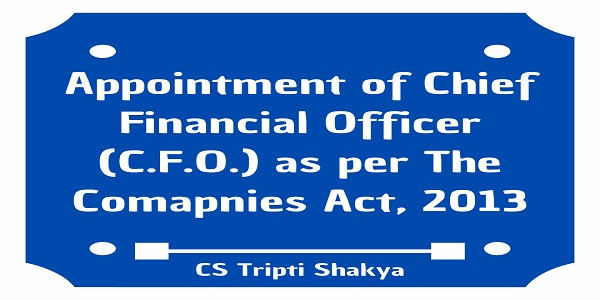As per Wikipedia The chief financial officer (CFO) is officer of a company that has primary responsibility for managing the company’s finances, including financial planning, management of financial risks, record-keeping, and financial reporting. In some sectors, the CFO is also responsible for analysis of data. Some CFOs have the title CFOO for chief financial and operating officer.
Most CFOs of large companies have finance qualifications such as a Master of Business Administration (MBA), Master of Science (in either Finance or Accounting), CFA or come from an accounting background such as a Certified Public Accountant. A finance department usually consists of qualified accountants such as Certified Public Accountant, Chartered Accountant, Certified Management Accountant, Chartered Certified Accountant.
As they have such important role in a company, their appointment is covered under the Companies Act, 2013. Let’s us go through the important aspects as well as procedure for appointment of Chief Financial Officer (C.F.O.).

Page Contents
- Who is Chief Financial Officer (C.F.O.)?
- Why are C.F.O. appointed in a company?
- Which companies are required to appoint a Chief Financial Officer (C.F.O.)?
- What laws governs the appointment of Chief Financial Officer (C.F.O.)?
- Is Chief Financial Officer (C.F.O.) is considered as Key Managerial personnel (KMP)?
- For how long a Chief Financial Officer (C.F.O.) can serve in a company?
- What is the process to appoint a Chief Financial Officer (C.F.O.)?
- What are the forms to appoint a Chief Financial Officer (C.F.O.) in a company?
- What if Chief Financial Officer (C.F.O.) resigns from the company?
- What are the documents required for appointment of Chief Financial Officer (C.F.O.)?
- What if company fails to appoint a Chief Financial Officer (C.F.O.)?
Who is Chief Financial Officer (C.F.O.)?
As per the Companies Act, 2013 Chief Financial Officer (C.F.O.) means a person appointed as the Chief Financial Officer of a company.
The Companies Act, 2013 does defines the qualification, experience or term or conditions for Chief Financial Officer (C.F.O.). Nor its does defines the role, functions, term and conditions, etc to be strictly adhered by Chief Financial Officer (C.F.O.).
Hence, it is purely the discretion of management of company what their qualifications, experience, roles or functions. Though it may be notes that it should be clearly set out in appointment letter to be furnished by company to appointee Chief Financial Officer (C.F.O.).

Why are C.F.O. appointed in a company?
A Chief Financial Officer (C.F.O.) of a company that has primary responsibility for managing the company’s finances, including financial planning, management of financial risks, record-keeping, and financial reporting. In some sectors, the CFO is also responsible for analysis of data.
Also note that now a days there is concept of Virtual Chief Financial Officer (C.F.O.) also. A virtual CFO is an outsourced service provider offering high skill assistance in financial requirements of an organization, just like a chief financial officer does for large organizations. A virtual CFO may be a single person or an entity.
Different Countries have their different definition and powers lying there is no universal roles defined for Chief Financial Officer (C.F.O.)s and different qualification to criteria for eligibility.
Which companies are required to appoint a Chief Financial Officer (C.F.O.)?
As per section 203 of the Companies Act, 2013 a Chief Financial Officer (C.F.O.) is considered as Key managerial Personnel. And below given companies are required to appoint a Chief Financial Officer (C.F.O.): –
1. Every listed company
2. every other public company having a paid-up share capital of ten crore rupees or more.
What laws governs the appointment of Chief Financial Officer (C.F.O.)?
The appointment and other related provisions for appointment of Chief Financial Officer (C.F.O.) are:-
1. The Companies Act, 2013
2. SEBI (Listing Obligations and Disclosure requirements) Regulations, 2015.
Is Chief Financial Officer (C.F.O.) is considered as Key Managerial personnel (KMP)?
As per the Companies Act, 2013, Every listed company and every other public company having a paid-up share capital of ten crore rupees or more are required to appoint Chief Financial Officer (C.F.O.) as Key managerial personnel (KMP).
As per interpretation if any company not falling in above category or ambit, a Chief Financial Officer (C.F.O.) are not required to appointed. Though, a company can voluntary comply with this provision.
Note that a Chief Financial Officer (C.F.O.) who is appointed as key Managerial personnel shall not hold office in more than one company except in its subsidiary company at the same time except, Chief Financial Officer (C.F.O.) can be appointed as Director in any other company after taking permission from the Board of company where they are appointed as Director.
For how long a Chief Financial Officer (C.F.O.) can serve in a company?
A Chief Financial Officer (C.F.O.) can be appointed for any number of years, it totally depends upon the management and already included in the appointment letter of Chief Financial Officer (C.F.O.) stating his term, reasons for cessation etc.
What is the process to appoint a Chief Financial Officer (C.F.O.)?
The following process is followed for appointment of Chief Financial Officer (C.F.O.): –
1. Prepare notice of board meeting along with draft resolution(s) to be passed in the board meeting for candidate consideration for appointment as Chief Financial Officer (C.F.O.).
2. Sending of Notice along with Agenda of Board meeting to all the Directors of company.
3. Convene board meeting and pass the following Board Resolution.
4. Sending of Outcome of Board Meeting to Stock exchange wherever company’s securities are listed within 30 minutes from the conclusion of meeting. (this point is applicable for listed companies only)
5. Issue letter of appointment to the candidate for their appointment as Chief Financial Officer (C.F.O.).
6. File e-Form DIR-12 along with attachments with the Registrar of Companies regarding appointment of director and simultaneously as a Chief Financial Officer (C.F.O.) within thirty (30) days from appointment as Chief Financial Officer (C.F.O.).
7. Sending of Appointment letter to Chief Financial Officer (C.F.O.) and entry in register, minute books, etc of company.
What are the forms to appoint a Chief Financial Officer (C.F.O.) in a company?
Only three forms are required for appointment of Chief Financial Officer (C.F.O.) and these are:-
1. DIR-12 within thirty (30) days
2. MR-1 within sixty (60) days
What if Chief Financial Officer (C.F.O.) resigns from the company?
There are many times when a situation arises that a Chief Financial Officer (C.F.O.) wants to resign from the company, whatever the reason maybe.
If a Chief Financial Officer (C.F.O.) resigns, she/he can anytime resign from the company after giving a notice as well as reason. The company will take the required steps for such resignation.
It should be noted that the resulting vacancy shall be filled-up by the Board at a meeting of the Board within a period of six months from the date of such vacancy.
What are the documents required for appointment of Chief Financial Officer (C.F.O.)?
The following documents are required: –
1. Intimation letter to stock exchange
2. Copy of Board Resolution for Board Meeting
3. Consent letter of proposed Chief Financial Officer (C.F.O.)
4. Appointment letter
5. Any other as required.
What if company fails to appoint a Chief Financial Officer (C.F.O.)?
Any company which is mandatorily required to appoint a Chief Financial Officer (C.F.O.) if don’t appoint, such company shall be liable to a penalty of five lakh rupees and every director and key managerial personnel of the company who is in default shall be liable to a penalty of fifty thousand rupees and where the default is a continuing one, with a further penalty of one thousand rupees for each day after the first during which such default continues but not exceeding five lakh rupees.
*****
Disclaimer: – The above article is prepared keeping in mind all the important and basic question as well as provision of section 203 of the Companies Act, 2013 which comes in mind of a professional or other stakeholder while company doing appointing a Chief Financial Officer (C.F.O.) in a company. The author has tried to cover all the important and basic question. Under no circumstance, the author shall not liable for any direct, indirect, special or incidental damage resulting from, arising out of or in connection with the use of the information.
(The Author is Corporate Consultant and provides varied array of services including Start-ups mentor, Secretarial, Legal, Trademark, taxation, Audit, GST, Book keeping and other ancillary advisory service in Delhi, Chandigarh as well as The National Capital Region (NCR) and can be contacted through email id:- triptishakyacs2017@gmail.com and Contact Number: 91-8178515005)






a person has prohibited by the court to become a director in a company or partner in LLP/firm.
Can he become KMP (except MD) in a company like CEO, CFO
what procedure a pvt limited company shall follow for appointing CFO
The moot question is whether a CFO in a company can hold duel post of company secretary or while time director as well Remember cs, cfo and MD or wtd are KMP with different roles inthe company. But many companies are doing so.
may pls share the rqmnt if any employee is redesignated as kmp of the company
There is no requirement to file MR-1 for the appointment of CFO. The requirement has omitted by MCA notification dated 30th june, 2016. Please amend the article accordingly.